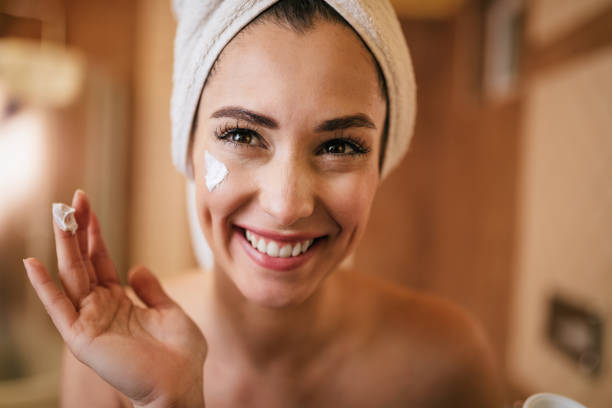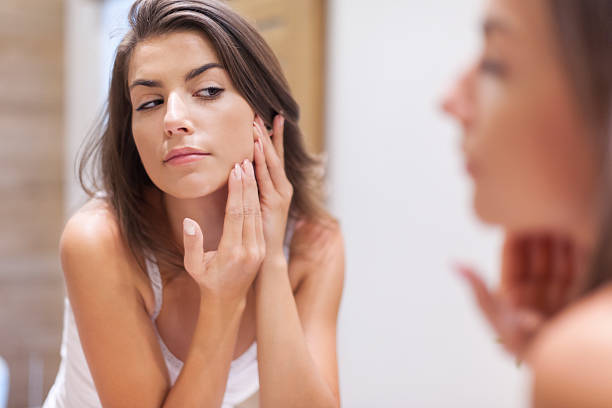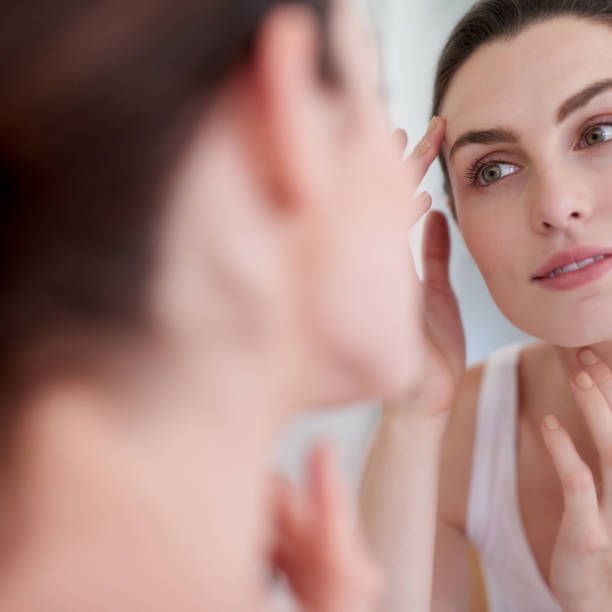I. Introduction
Normal skin, the epitome of skin health, is a state often coveted but not always understood. In this comprehensive guide, we’ll delve deep into the world of normal skin, unraveling its characteristics, debunking myths, and exploring the factors that influence it. Understanding normal skin is vital because it serves as a baseline for recognizing skin problems. Let’s embark on this journey through the layers of our body’s largest organ, demystifying the secrets of a healthy complexion.
II. Characteristics of Normal Skin
Normal skin boasts a harmonious balance of oil and moisture. It feels neither too oily nor too dry, ensuring a smooth texture and even tone. Unlike problematic skin types, normal skin remains resilient and adapts well to environmental factors. Think of it as the Goldilocks of skin—neither too oily nor too dry, just right.

III. Factors Affecting Normal Skin
Genetic factors primarily influence your skin type. However, external factors like pollution, climate, hydration, diet, and Sleep patterns also have a significant impact on determining an individual’s health. It’s essential to make healthy lifestyle choices, such as maintaining a balanced diet and staying adequately hydrated. Additionally, the skincare products you use and your daily skincare routine are equally important for achieving and maintaining healthy skin.
IV. Common Misconceptions about Normal Skin
Myth: Normal Skin Doesn’t Need Skincare
Contrary to popular belief, normal skin requires care. While it might not have acute issues, a proper skincare routine maintains its health and youthfulness.
Myth: Normal Skin Is Immune to Aging
Even normal skin isn’t immune to aging. A regular skincare regimen can delay the signs of aging, ensuring a youthful appearance.
Myth: Normal Skin Doesn’t Require Sun Protection
Normal skin needs sun protection, too. UV rays can harm even the healthiest_skin, making sunscreen a must in your daily routine.
Myth: Normal Skin Doesn’t Get Sensitized
Normal skin can become sensitized due to various factors. Choosing gentle products helps prevent irritation and maintain balance.

V. Importance of Skincare Routine for Normal Skin
A. Cleansing and Hydration
Regular cleansing removes impurities and maintains the skin’s natural pH balance. Hydrating cleansers ensure that your_skin remains clean without stripping away essential moisture.
B. Sun Protection and Antioxidants
I was applying sunscreen to shield normal skin from harmful UV rays. Antioxidants, found in serums and creams, protect against free radicals, preserving skin_health.
C. Choosing the Right Products (Avoiding Harsh Chemicals)
Opt for products with natural ingredients, avoiding harsh chemicals that can disrupt your skin’s balance. Read labels and choose wisely.
D. Regular Exfoliation and Anti-Aging Products
Gentle exfoliation removes dead_skin_cells, promoting a radiant complexion. Anti-aging products, rich in retinoids and peptides, maintain skin_elasticity.
VI. Special Considerations for Different Age Groups
A. Normal Skin in Infants and Children
Infant_skin is delicate. Use mild, hypoallergenic products to maintain its softness. As children grow, teach them good skincare habits early on.
B. Normal Skin in Teenagers
Teenage_skin can be prone to hormonal fluctuations. A balanced diet, proper hygiene, and non-comedogenic products help manage occasional breakouts.
C. Normal Skin in Adults
Adult_skin faces environmental challenges. Regular skin_care, a healthy lifestyle, and stress management maintain normal skin health.
D. Normal Skin in People Over 70 Years of Age
As we age, our_skin thins and loses elasticity. It’s important to moisturize regularly, protect from the sun, and use products with hyaluronic acid to retain moisture.

VII. Addressing Common Issues Even in Normal Skin
A. Occasional Breakouts and Hormonal Changes
Hormonal changes can cause breakouts. Consistent skincare and dermatologist advice can help.
B. Seasonal Changes and Skin Reactions
Seasonal changes affect normal skin. Adjust your skincare routine according to the weather to prevent dryness or excessive oiliness.
C. Stress-Related Skin Problems
Relaxation practices like yoga and meditation can reduce stress and improve skin_health.
D. Allergies and Sensitivities
Be mindful of allergies. Patch-test new products and consult an allergist if you suspect any sensitivities, ensuring your_skin remains irritation-free.
VIII. Maintaining Normal Skin Health Naturally
A. Importance of Balanced Diet and Hydration
Maintaining a balanced diet is not just vital for your overall health; it significantly impacts your_skin, too. Opt for a diet rich in fruits, vegetables, whole grains, and lean proteins. These nutrient-packed foods provide antioxidants, vitamins, and minerals essential for healthy_skin. Hydration is equally crucial. Drinking an ample amount of water daily keeps your_skin hydrated, ensuring it remains supple and radiant.
B. Exercise and Its Impact on Skin Health
Regular physical activity benefits your_skin in multiple ways. Exercise improves blood circulation, ensuring that essential nutrients reach your_skin cells and promoting a healthy glow. Moreover, when you sweat during your workouts, your pores open up, releasing trapped dirt and oil. Just remember to cleanse your_skin post-workout to prevent any buildup.
C. Stress Management Techniques
Stress can wreak havoc on your_skin, leading to breakouts and other skin_issues. Engaging in stress-relieving activities such as yoga, meditation, or even a simple walk in nature can significantly reduce stress levels. Adequate sleep is also vital; it allows your_skin to repair and regenerate, enhancing its overall health.
D. Natural Skincare Remedies and DIY Masks
Nature offers a plethora of ingredients that can enhance your skin’s health. Honey, known for its antibacterial properties, makes an excellent base for masks. Combined with yogurt, it can soothe and hydrate your_skin. Oatmeal gently exfoliates, revealing fresh_skin. Aloe vera gel reduces inflammation and promotes skin_regeneration, making it ideal for skin_care.

IX. Skin Health: Embracing the Radiance Within
In the pursuit of healthy_skin, embracing your natural beauty is essential. Appreciate the uniqueness of your_skin, and understand that skincare is not just a routine—it’s a form of self-care and self-love. By nurturing your_skin, you’re promoting your overall well-being.
X. FAQs
Q1: Is it necessary to use sunscreen on normal skin?
A1: Yes, sunscreen is essential for all skin_types, including normal skin. It protects against UV rays, preventing premature aging and skin_damage.
Q2: Can normal skin become sensitive over time?
A2: Yes, normal skin can become sensitized due to various factors such as harsh weather, stress, or using unsuitable skincare products. It’s important to choose gentle products to prevent sensitivities.
Q3: How often should I exfoliate normal skin?
A3: Exfoliate 1-3 times weekly; overdoing it strips natural oils.
Q4: What diet is best for maintaining normal skin health?
A4: Avoiding processed foods and sugary drinks is essential for healthy_skin.
Q5: Can stress really affect my skin?
A5: Yes, stress can trigger skin_issues like breakouts and sensitivities. Managing stress through relaxation techniques, exercise, and sufficient sleep is crucial for maintaining healthy_skin.
Q6: Is normal skin immune to skin problems like acne and sensitivity?
A6: While normal skin is generally well-balanced, it is not entirely immune to skin_problems. Normal skin can still experience occasional breakouts, sensitivity, and other issues due to factors like stress, hormonal changes, or harsh environmental conditions. It’s essential to maintain a proper skincare routine to address these concerns.
Q7: Can normal skin become dry or oily based on changing weather conditions?
A7: Yes, normal_skin can be influenced by weather changes. In dry climates, normal skin may feel slightly dry and require additional hydration. Conversely, in humid conditions, it may appear oily. Adapting your skincare routine according to the weather can help maintain its balance.
Q8: How often should I change my skincare products for normal skin?
A8: Stick to a skincare routine that works for your_skin type. Avoid changing products too often, as it can disrupt the balance of your_skin. Introduce new products carefully and monitor how your_skin responds.
Q9: Can average skin benefit from anti-aging products and routines?
A9: Yes, normal_skin can benefit from anti-aging products. While it may not show significant signs of aging early on, using products with ingredients like retinoids, hyaluronic acid, and antioxidants can help maintain its youthful appearance. Prevention is critical, and these products can support skin_elasticity and collagen production.
Q10: What role does diet play in maintaining normal skin health?
A10: Maintaining normal_skin requires a healthy diet and drinking plenty of water. Adequate intake of vitamins, minerals, and antioxidants supports skin_regeneration while promoting overall health. To help inform skincare routines, we’ve answered some common questions about everyday skin_concerns.
Conclusion: Embracing Healthy Skin Habits
In the realm of skincare, normal skin serves as a canvas of beauty and health. By understanding its nuances, debunking myths, and adopting a holistic approach to skincare, you empower yourself to maintain a radiant complexion throughout your life. Remember, your_skin reflects your overall well-being; nurture it, cherish it, and let your natural radiance shine through.
Read also_Skin Whitening Home Remedies: Unveiling Natural Radiance

